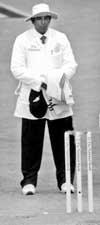|
|
||||
|
Umpiring the topic of discussion again My mind wonders back to one of the earliest cricket phrases I learnt, “the umpires’ word is law!” Mind you, that is about forty two years ago. Whether it was a soft ball game in the park or an organized leather ball cricket match that phrase was commonly used at that time. Now, forty two years later that phrase is dead and buried. “The umpires’ word is not the law!”
It is very simple. The manner in which the sport is played, the intention of the players and the character of those who umpire, have all added to the equation. As much as all else around “cricket umpiring” is also a complex subject. Who on earth would have imagined of a situation when an international umpire would bargain on USD500,000/- to hang up his coat. Add to that he is in the midst of a controversy where a test match has been awarded to a team because the other side did not turn up after a break as a result of a decision made by that particular umpire! Let us remind ourselves that his partner was also part of the decision. He was not the spokesperson, he did not play the lead role, he did not discuss finances and has therefore got away unscathed. Umpiring at international level has become a very tough job. The laws and playing conditions are so vast. The match situations differ by the day. The playing surfaces, the crowds, the weather all have a part to play. Should that not be enough, the electronic and print media are eternally breathing down the neck. There is some consolation now that line decision and a few other decisions could be referred to the third umpire who view replays on a TV screen and then decide. Although there is a cry to use technology more for practical reasons technology only sorts some of the issues. “Hawk-eye” the devise used by many TV companies to judge lbw decisions is not precise. The device cannot judge the change in bounce over a period of a day and over five days or the differences when the ball pitches on the rough and the more smooth areas of a pitch. Further strengthening this case are those who have stood in the middle as international umpires. Dickie Bird, David Shepherd, Peter Willey, Niel Mallander and now Mark Benson have all played test or county cricket. All outstanding umpires. India’s Srinivas Venketraghavan was up there amongst the best and at his peak could have been classed as best in the world. Sri Lanka’s Asoka de Silva is another case in point. He had a spell in the ‘Elite panel’ but is no more. He is certainly good enough to be there. As the men who control the game, umpires cannot be stubborn, arrogant or egoistic. They have to be reasonable, understanding and flexible up to a point. Lapses in concentration must be minimized. Decision making must be honest. Embrace all that and then we will be able to bring back the phrase “Umpires word is law!” |
||||
Copyright © 2006 Wijeya Newspapers
Ltd. All rights reserved. |

 With
whatever assistance available an umpire will have plenty of decisions
to make in a day. Who is best equipped to make least mistakes and
also be in control of proceedings on the field? In my opinion having
played is of utmost importance. There will be the exceptions of
course. This is best exemplified in the first class game in England.
A vast majority are former test or county players. The huge difference
it makes is that they handle situations in the game better because
often they have experienced such situations in their playing days.
They also naturally earn respect from the players.
With
whatever assistance available an umpire will have plenty of decisions
to make in a day. Who is best equipped to make least mistakes and
also be in control of proceedings on the field? In my opinion having
played is of utmost importance. There will be the exceptions of
course. This is best exemplified in the first class game in England.
A vast majority are former test or county players. The huge difference
it makes is that they handle situations in the game better because
often they have experienced such situations in their playing days.
They also naturally earn respect from the players.